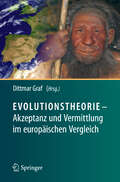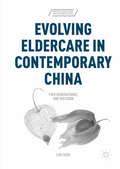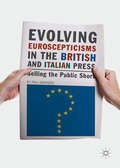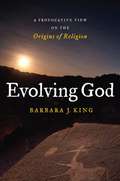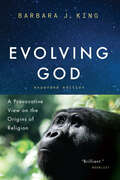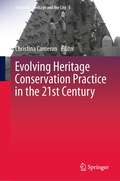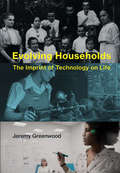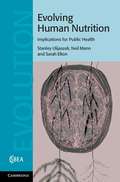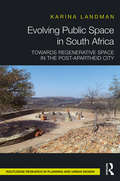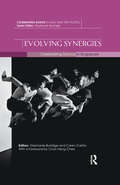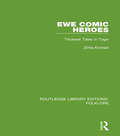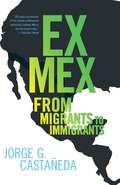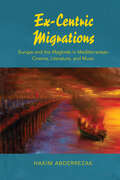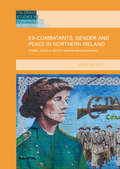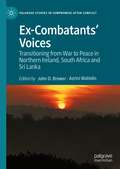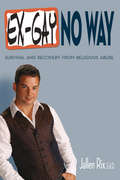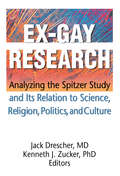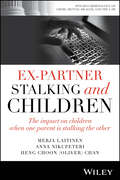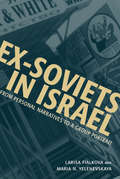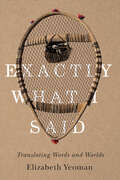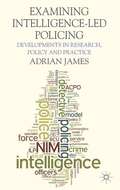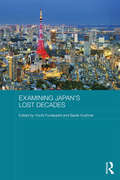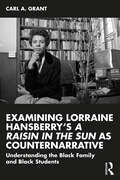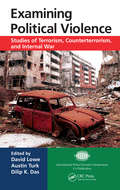- Table View
- List View
Evolutionstheorie - Akzeptanz und Vermittlung im europäischen Vergleich
by Dittmar GrafDie Evolutionstheorie hat sich in den letzten 150 Jahren von einer speziellen naturwissenschaftlichen zur universellen wissenschaftlichen Theorie entwickelt. Sie bezieht Phänomene von der Lebensentstehung bis zu den kulturellen und geistigen Entwicklungen des Menschen ein. Die Evolutionstheorie ist das Fundament der modernen Biologie. Dennoch ist sie bis heute die vermutlich umstrittenste Theorie der Menschheitsgeschichte. Ein großer Teil der Menschen in aller Welt lehnt sie bis heute vehement ab. Das Buch nähert sich diesem Phänomen, indem es einerseits einen interdisziplinären Einblick in die evolutionäre Forschung ermöglicht und damit Wissenschaftler aus unterschiedlichen Disziplinen die Möglichkeit bietet, über ihre Forschung zu berichten. Andererseits schildern Forscher aus verschiedenen europäischen Ländern die spezifischen Schwierigkeiten bezüglich der Akzeptanz der Evolutionstheorie.
Evolving Eldercare in Contemporary China
by Lin ChenWith an increasing number of elders moving into nursing homes, the shift from family to nursing home care calls for an exploration of caregiving decision-making in urban China. This study examines how a rapidly growing aging population, the one-child policy, and economic reform in urban China pose unprecedented challenges to the country's ingrained tradition of family caregiving. It presents interviews of matched elders and their children from a government-sponsored nursing home in Shanghai and analyzes the decision-making process of institutionalization. This book offers fresh insight into the evolving culture and arrangements of caregiving in contemporary Chinese society, illuminating the diverse needs for long-term care of Chinese elders-the world's largest aging population-in the coming decades.
Evolving Euroscepticisms in the British and Italian Press
by Paul RowinskiThis book argues that the discursive construction of the EU in national newspapers is pivotal in creating an environment of Euroscepticism. The volume challenges the persuasive, manipulative and prejudicial language that is sometimes peddled in the influential UK Murdoch and Italian Berlusconi press, using the main focus points of the key Eurosceptic triggers of the € the subsequent national economic crises; and immigration, investigated through major events covered over two decades, including the UK's recent Brexit vote and Italy's constitutional crisis. Rowinski looks at the latest chapter of Euroscepticism: the increasingly key protagonists of the UK Independence Party and Italy's Five Star Movement, who want to take Britain out of the EU and Italy out of the euro. This book offers a rigorous academic analysis presented in an accessible style to experts and laypersons alike, exploring concrete articulations of Euroscepticism in the press.
Evolving God
by Barbara J. KingThis cutting-edge book—with echoes of both Jane Goodall and Joseph Campbell—adds a fascinating new dimension to the debate about the origins of religion. The study of evolution has uncovered invaluable information about many aspects of human behavior and culture, from the physiology of our bodies and brains to the development of hunting, technology, and social groups. But an understanding of the intangibles of human experience, especially religion, lags far behind. Attempts to discover the source of ...
Evolving God: A Provocative View on the Origins of Religion, Expanded Edition
by Barbara J. KingReligion has been a central part of human experience since at least the dawn of recorded history. The gods change, as do the rituals, but the underlying desire remains—a desire to belong to something larger, greater, most lasting than our mortal, finite selves. But where did that desire come from? Can we explain its emergence through evolution? Yes, says biological anthropologist Barbara J. King—and doing so not only helps us to understand the religious imagination, but also reveals fascinating links to the lives and minds of our primate cousins. Evolving God draws on King’s own fieldwork among primates in Africa and paleoanthropology of our extinct ancestors to offer a new way of thinking about the origins of religion, one that situates it in a deep need for emotional connection with others, a need we share with apes and monkeys. Though her thesis is provocative, and she’s not above thoughtful speculation, King’s argument is strongly rooted in close observation and analysis. She traces an evolutionary path that connects us to other primates, who, like us, display empathy, make meanings through interaction, create social rules, and display imagination—the basic building blocks of the religious imagination. With fresh insights, she responds to recent suggestions that chimpanzees are spiritual—or even religious—beings, and that our ancient humanlike cousins carefully disposed of their dead well before the time of Neandertals. King writes with a scientist’s appreciation for evidence and argument, leavened with a deep empathy and admiration for the powerful desire to belong, a desire that not only brings us together with other humans, but with our closest animal relations as well.
Evolving Heritage Conservation Practice in the 21st Century (Creativity, Heritage and the City #5)
by Christina CameronThis book focuses on current trends in cultural heritage conservation and their influence on heritage practice. Seen through the lenses of World Heritage, historic urban landscapes, heritage tourism, climate change or the nature/culture nexus, these challenges call for innovative approaches to protect and conserve our heritage places. The book brings together the voices of different stakeholders in the heritage conservation process, ranging from scholars, site managers and government officials to young professionals and students.
Evolving Households: The Imprint of Technology on Life (The\mit Press Ser.)
by Jeremy GreenwoodThe transformative effect of technological change on households and culture, seen from a macroeconomic perspective through simple economic models.In Evolving Households, Jeremy Greenwood argues that technological progress has had as significant an effect on households as it had on industry. Taking a macroeconomic perspective, Greenwood develops simple economic models to study such phenomena as the rise in married female labor force participation, changes in fertility rates, the decline in marriage, and increased longevity. These trends represent a dramatic transformation in everyday life, and they were made possible by advancements in technology. Greenwood also addresses how technological progress can cause social change.Greenwood shows, for example, how electricity and labor-saving appliances freed women from full-time household drudgery and enabled them to enter the labor market. He explains that fertility dropped when higher wages increased the opportunity cost of having children; he attributes the post–World War II baby boom to a combination of labor-saving household technology and advances in obstetrics and pediatrics. Marriage rates declined when single households became more economically feasible; people could be more discriminating in their choice of a mate. Technological progress also affects social and cultural norms. Innovation in contraception ushered in a sexual revolution. Labor-saving technological progress at home, together with mechanization in industry that led to an increase in the value of brain relative to brawn for jobs, fostered the advancement of women's rights in the workplace. Finally, Greenwood attributes increased longevity to advances in medical technology and rising living standards, and he examines healthcare spending, the development of new drugs, and the growing portion of life now spent in retirement.
Evolving Human Nutrition
by Sarah Elton Neil Mann Stanley UlijaszekWhile most of us live our lives according to the working week, we did not evolve to be bound by industrial schedules, nor did the food we eat. Despite this, we eat the products of industrialization and often suffer as a consequence. This book considers aspects of changing human nutrition from evolutionary and social perspectives. It considers what a 'natural' human diet might be, how it has been shaped across evolutionary time and how we have adapted to changing food availability. The transition from hunter-gatherer and the rise of agriculture through to the industrialisation and globalisation of diet are explored. Far from being adapted to a 'Stone Age' diet, humans can consume a vast range of foodstuffs. However, being able to eat anything does not mean that we should eat everything, and therefore engagement with the evolutionary underpinnings of diet and factors influencing it are key to better public health practice.
Evolving Public Space in South Africa: Towards Regenerative Space in the Post-Apartheid City
by Karina LandmanEvolving Public Space in South Africa discusses the transformation of public space highlighted in the country. Drawing on examples from major cities, the author demonstrates that these spaces are not only becoming wasted space, but are also adapting and evolving to accommodate new users and uses in various parts of the city. This process of evolution tends to challenge the more traditional visions and general global views of declining public space in cities and argues that it rather resembles the resilience of these spaces and the potential for regeneration through continuously emerging and mutating forms, functions and meanings. Including over 20 black-and-white images, this book would be beneficial to academics and students of urban planning and design and those interested in the regeneration of cities.
Evolving Synergies: Celebrating Dance in Singapore (Celebrating Dance in Asia and the Pacific)
by Stephanie Burridge Caren CariñoA comprehensive overview of the dance culture of Singapore, this book embodies storytelling, personal reflections, memories, and histories of the artists. The extensive calendar of events encompassing companies and soloists from diverse dance practices, such as Indian, Malay and Chinese and a variety of Western contemporary dances, underline Singapore as a vibrant player in the evolution of Asian culture.
Ewe Comic Heroes: Trickster Tales in Togo (Routledge Library Editions: Folklore)
by Zinta KonradThe trickster character is prominent in the cultural, particularly narrative, traditions of many different peoples throughout the world. Comic and serious, stupid and clever, benevolent and evil, winner and loser, the trickster is a study in contradictions. The trickster cannot be pigeonholed, for he does not fit into any neat categories or definitions. This study, first published in 1994, aims to give the reader the opportunity to experience in some small measure the dynamic and exciting dramatic oral narrative performances of the Ewe people of West Africa.
Ex Mex
by Jorge G. CastanedaFrom the massive nationwide rally in support of immigrant rights in May 2006 to protests against the increasingly frequent immigration raids across the country, the public debate on immigration reform has largely centered on Mexican immigrants. Yet, in the United States, we rarely hear the Mexican perspective on the issue.In "portraits that defy American stereotypes of who is a Mexican immigrant" (Booklist ), former Mexican foreign minister and eminent scholar Jorge G. Castañeda describes just who makes up the newest generation of immigrants from Mexico, why they have chosen to live in the United States, where they work, and what they ultimately hope to achieve. Drawing on his wide-ranging experience, Casteñeda examines the century-long historical background behind the labor exchange between Mexico and the United States, while offering an insider's account of the official conversations and secret negotiations between the two countries in recent years.Both authoritative and timely, Ex Mex is essential reading for all who want to make sense of the complex issue of immigration.
Ex-Centric Migrations: Europe and the Maghreb in Mediterranean Cinema, Literature, and Music
by Hakim Abderrezak“Plunges the reader into a tour de force across radically divergent artistic responses to Mediterranean migration.” —Bulletin of Francophone Postcolonial StudiesEx-Centric Migrations examines cinematic, literary, and musical representations of migrants and migratory trends in the western Mediterranean. Focusing primarily on clandestine sea-crossings, Hakim Abderrezak shows that despite labor and linguistic ties with the colonizer, migrants from the Maghreb (Morocco, Algeria, and Tunisia) no longer systematically target France as a destination, but instead aspire toward other European countries, notably Spain and Italy. In addition, the author investigates other migratory patterns that entail the repatriation of émigrés. His analysis reveals that the films, novels, and songs of Mediterranean artists run contrary to mass media coverage and conservative political discourse, bringing a nuanced vision and expert analysis to the sensationalism and biased reportage of such events as the Mediterranean maritime tragedies.“Ex-Centric Migrations is crucial reading for scholars and students of contemporary Maghrebi, French, and Spanish literatures and cultures. It breaks new ground by encompassing the literature, film, and music of ‘return migration’ and examining the trajectories of Maghrebi migration outside France.” —H-France“Hakim Abderrezak convincingly illustrates how politically committed artistic practices serve to humanize the challenges of human migration, and in the process dramatically improves our understanding of the complex cultural, economic, political, and social realities that shape 21st-century existence.” —Dominic Thomas, author of Africa and France: Postcolonial Cultures, Migration, and Racism
Ex-Combatants, Gender and Peace in Northern Ireland
by Azrini WahidinThis book explores the contours of women's involvement in the Irish Republican Army, political protest and the prison experience in Northern Ireland. Through the voices of female and male combatants, it demonstrates that women remained marginal in the examination of imprisonment during the Conflict and in the negotiated peace process. However, the book shows that women performed a number of roles in war and peace that placed constructions of femininity in dissent. Azrini Wahidin argues that the role of the female combatant is not given but ambiguous. She indicates that a tension exists between different conceptualisations of societal security, where female combatants both fought against societal insecurity posed by the state and contributed to internal societal dissonance within their ethno-national groups. This book tackles the lacunae that has created a disturbing silence and an absence of a comprehensive understanding of women combatants, which includes knowledge of their motivations, roles and experiences. It will be of particular interest to scholars of criminology, politics and peace studies.
Ex-Combatants’ Voices: Transitioning from War to Peace in Northern Ireland, South Africa and Sri Lanka (Palgrave Studies in Compromise after Conflict)
by John D. Brewer Azrini WahidinThis book develops the discourse on the experiences of ex-combatants and their transition from war to peace, from the perspective of scholars across disciplines. Ex-combatants are often overlooked and ignored in the post-conflict search for memory and understanding, resulting in their voice being excluded or distorted. This collection seeks to disclose something of the lived experience of ex-combatants who have made the transition from war to peace to help to understand some of the difficulties they have encountered in social and emotional reintegration in the wake of combat. These include: motivations and mobilizations to participation in military struggle; the material difficulties experienced in social reintegration after the war; the emotional legacies of conflict; the discourses they utilize to reconcile their past in a society moving forward from conflict toward peace; and ex-combatants’ subsequent engagement – or not – in peacebuilding. It also examines the contributions that former combatants have made to post-conflict compromise, reconciliation and peacebuilding. It focusses on male non-state actors, women, child soldiers and, unusually, state veterans, and complements previous volumes which captured the voices of victims in Northern Ireland, South Africa and Sri Lanka. This volume speaks to those working in the areas of sociology, criminology, security studies, politics, and international relations, and professionals working in social justice and human rights NGOs.
Ex-Gay No Way: Survival and Recovery from Religious Abuse
by Jallen RixBringing to light an extreme fundamentalist Christian view, this insider's perspective offers hope to people grappling with the aftereffects of a cult-like movement often known as "Reparative Therapy." The movement assumes that going from gay to straight is easily changeable and change-worthy, despite decades of psycho/sexual research to the contrary. Although it did not succeed in making the author-a Southern Baptist who attended an ex-gay ministry at a young age-straight, it did undermine his self-esteem and confuse him significantly, thus leading him to pursue an advanced degree in sexology in order to help others in similar positions. Offering a detailed comparison of the ex-gay world and the phenomenon known as Religious Abuse, this manual shares a personal journey through the hopeless mistreatment and manipulative system of ex-gay ministries and the recovery process involved in regaining strength, acceptance, and self-worth.
Ex-Gay Research: Analyzing the Spitzer Study and Its Relation to Science, Religion, Politics, and Culture
by Jack Drescher Kenneth J ZuckerDefenders and critics of the controversial Spitzer study analyze its methodologies and findingsIn 2001, Robert L. Spitzer, MD, presented his study on sexual conversion therapy with its controversial findings that some homosexuals can change their sexual orientation. The resulting media sensation and political firestorm enraged the study&’s critics and emboldened its supporters. Ex-Gay Research: Analyzing the Spitzer Study and Its Relation to Science, Religion, Politics, and Culture presents leading experts examining Spitzer&’s research methodology and findings to discern whether the study itself deserves deeper consideration or outright dismissal. Every facet of the study is reviewed to discuss the positive or negative aspects of the results, its significance in political and social terms, and the implications for the future. Dr. Spitzer himself was an instrumental figure in the American Psychiatric Association's decision in 1973 to remove homosexuality as a mental illness listing from the Diagnostic and Statistical Manual-III. His later study that states that in some individuals, homosexuality may be more fluid than previously thought stirred controversy in the psychiatric community and society at large. His study is presented here to allow the reader to evaluate and consider it for themselves. Leading experts then voice their own pro or con views on the methodology and findings. Ex-Gay Research: Analyzing the Spitzer Study and Its Relation to Science, Religion, Politics, and Culture fearlessly illustrates the sometimes fuzzy boundary between science and politics, courageously spotlighting the culture wars now dividing our society.Ex-Gay Research: Analyzing the Spitzer Study and Its Relation to Science, Religion, Politics, and Culture discusses: the ex-gay movement the nature of scientific inquiry the relationship between science and politics the results of sexual conversion therapies gay and lesbian rightsEx-Gay Research: Analyzing the Spitzer Study and Its Relation to Science, Religion, Politics, and Culture is essential reading for sex researchers, mental health professionals, pastoral counselors, political activists, and any person asking if one can truly "change" his or her homosexuality.
Ex-Partner Stalking and Children: The Impact on Children When One Parent is Stalking the Other (Psycho-Criminology of Crime, Mental Health, and the Law)
by Heng Choon Oliver Chan Merja Laitinen Anna NikupeteriPROVIDES AN AUTHORITATIVE OVERVIEW OF STALKING BEHAVIOR PERPETRATED BY PARENTS AND ITS IMPACTS ON CHILDREN Stalking targeted at one of the child’s parents by the other poses a major psychosocial and physical threat to children’s wellbeing and security. Although interdisciplinary research on stalking has expanded in recent decades, intimate partner/ex-partner stalking has been viewed as an “adults only” problem. Ex-Partner Stalking and Children brings together scholars and practitioners from different disciplines in the field to examine ex-partner stalking as a psychosocial and criminological issue in children’s and young people’s lives. Providing both theoretical and practical perspectives, this comprehensive volume explores approaches for increasing awareness of parental stalking, addressing its impacts on children and young people, and advancing interventions and methods of support for them. Throughout the text, the authors challenge existing conceptions of intimate partner/ex-partner stalking as a phenomenon that exists only between the partners, rather than a form of gendered violence that creates a victimizing environment for the children. A novel contribution to both scholarly and practical understandings of ex-partner stalking, this important book: Addresses a gap in knowledge on the socially, ethically, and legally challenging phenomenon of cases when one parent is stalking the otherOffers insights and tools to help practitioners better recognize, support, and intervene in parental stalking situations involving childrenExamines research findings on stalking behavior, including psychological and trauma perspectivesDiscusses best practices and working methods, challenges in identifying the child’s experiences, and factors preventing children from receiving helpRecommends future directions in promoting children’s and young people’s rights in ex-partner stalking Part of the acclaimed Psycho-Criminology of Crime, Mental Health, and the Law series, Ex-Partner Stalking and Children: The Impact on Children When One Parent is Stalking the Other is essential reading for undergraduate and graduate students in disciplines such as criminology, social work, healthcare, psychology, and education, and an invaluable resource for law enforcement staff, nurses, psychologists, therapists, social workers, teachers, and other professionals who work with victims of stalking.
Ex-Soviets in Israel: From Personal Narratives to a Group Portrait
by Larisa Fialkova Maria YelenevskayaA groundbreaking study of personal stories from ex-Soviet immigrants in Israel, bringing together scholarship in anthropology, sociology, linguistics, semiotics, and social psychology.
Exactly What I Said: Translating Words and Worlds
by Elizabeth Yeoman“You don’t have to use the exact same words.… But it has to mean exactly what I said.” Thus began the ten-year collaboration between Innu elder and activist Tshaukuesh Elizabeth Penashue and Memorial University professor Elizabeth Yeoman that produced the celebrated Nitinikiau Innusi: I Keep the Land Alive, an English-language edition of Penashue’s journals, originally written in Innu-aimun during her decades of struggle for Innu sovereignty. Exactly What I Said: Translating Words and Worlds reflects on that collaboration and what Yeoman learned from it. It is about naming, mapping, and storytelling; about photographs, collaborative authorship, and voice; about walking together on the land and what can be learned along the way. Combining theory with personal narrative, Yeoman weaves together ideas, memories, and experiences––of home and place, of stories and songs, of looking and listening––to interrogate the challenges and ethics of translation. Examining what it means to relate whole worlds across the boundaries of language, culture, and history, Exactly What I Said offers an accessible, engaging reflection on respectful and responsible translation and collaboration.
Exalted Subjects
by Sunera ThobaniQuestions of national identity, indigenous rights, citizenship, and migration have acquired unprecedented relevance in this age of globalization. In Exalted Subjects, noted feminist scholar Sunera Thobani examines the meanings and complexities of these questions in a Canadian context. Based in the theoretical traditions of political economy and cultural / post-colonial studies, this book examines how the national subject has been conceptualized in Canada at particular historical junctures, and how state policies and popular practices have exalted certain subjects over others.Foregrounding the concept of 'race' as a critical relation of power, Thobani examines how processes of racialization contribute to sustaining and replenishing the politics of nation formation and national subjectivity. She challenges the popular notion that the significance of racialized practices in Canada has declined in the post Second World War period, and traces key continuities and discontinuities in these practices from Confederation into the present. Drawing on historical sociology and discursive analyses, Thobani examines how the state seeks to 'fix' and 'stabilize' its subjects in relation to the nation's 'others.' A controversial, ground-breaking study, Exalted Subjects makes a major contribution to our understanding of the racialized and gendered underpinnings of both nation and subject formation.
Examining Intelligence-Led Policing
by Adrian JamesForeword from Professor Emeritus Robert Reiner, London School of Economics, UK. This book provides a critical examination of intelligence-led policing strategies, including an investigation of innovative strategies such as Problem Oriented Policing (POP), problem-solving, and community policing, and in-depth analyses of the Kent Policing Model, which became the template for ILP models across the world, and the UK's National Intelligence Model (NIM). Intelligence-led policing (ILP) approaches have proved particularly attractive to senior police officers and policymakers because they promise to deliver more efficient and effective solutions to the problems of crime than traditional policing practices. However, this book shows that these approaches have delivered far less than their supporters would have us to believe. In part, this has been because of what James terms as 'police orthodoxy'. However, this cannot wholly explain the relative failure of ILP in Britain and elsewhere in the developed world. Drawing on a range of material including extensive interviews with key NIM figures including ACPO members, senior police managers, intelligence workers, police detectives and staff, James questions to what extent British policing can truly be said to be intelligence-led, and whether there is a popular mandate for an alternative to traditional Peelian practice, where police aim simply to deliver intelligent rather than intelligence-led policing. The book provides important insights into the debate on intelligence-led policing and the mechanics and politics of policy development. As such it will be of great value within the policing sphere and more broadly for public policy studies.
Examining Japan's Lost Decades (Routledge Contemporary Japan Series)
by Yoichi Funabashi Barak KushnerThis book examines five features of Japan’s ‘Lost Decades’: the speed of the economic decline in Japan compared to Japan’s earlier global prowess; a rapidly declining population; considerable political instability and failed reform attempts; shifting balances of power in the region and changing relations with Asian neighbouring nations; and the lingering legacy of World War Two. Addressing the question of why the decades were lost, this book offers 15 new perspectives ranging from economics to ideology and beyond. Investigating problems such as the risk-averse behaviour of Japan’s bureaucracy and the absence of strong political leadership, the authors analyse how the delay of ‘loss-cutting policies’ led to the 1997 financial crisis and a state of political gridlock where policymakers could not decide on firm strategies that would benefit national interests. To discuss the rebuilding of Japan, the authors argue that it is first essential to critically examine Japan’s ‘Lost Decades’ and this book offers a comprehensive overview of Japan’s recent 20 years of crisis. The book reveals that the ‘Lost Decades’ is not an issue unique to the Japanese context but has global relevance, and its study can provide important insights into challenges being faced in other mature economies. With chapters written by some of the world’s leading Japan specialists and chapters focusing on a variety of disciplines, this book will be of interest to students and scholars in the areas of Japan studies, Politics, International Relations, Security Studies, Government Policy and History.
Examining Lorraine Hansberry’s A Raisin in the Sun as Counternarrative: Understanding the Black Family and Black Students
by Carl A. GrantExamining Lorraine Hansberry’s A Raisin in the Sun as Counternarrative: Understanding the Black Family and Black Students shows how and why Lorraine Hansberry’s play, A Raisin in the Sun, should be used as a teaching tool to help educators develop a more accurate and authentic understanding of the Black Family. The purpose of this book is to help educators develop a greater awareness of Black children and youth’s, humanity, academic potential and learning capacity, and for teachers to develop the consciousness to disavow white supremacy, American exceptionalism, myths, racial innocence, and personal absolution within the education system. This counternarrative responds to the flawed and racist perceptions, stereotypes, and tropes that are perpetuated in schools and society about the African American family and Black students in US schools. It is deliberative and reverberating in addressing anti-Black racism. It argues that, if Education is to be reimagined through a social justice structure, teachers must be educated with works that include Black artists and educators, and teachers must be committed to decolonizing their own minds. Examining Lorraine Hansberry’s A Raisin in the Sun as Counternarrative: Understanding the Black Family and Black Students is important reading for undergraduate and postgraduate courses in Educational Foundations, Curriculum and Instruction, Education Policy, Multicultural Education, Social Justice Education, and Black Studies. It will also be beneficial reading for in-service educators.
Examining Political Violence: Studies of Terrorism, Counterterrorism, and Internal War (International Police Executive Symposium Co-Publications)
by David Lowe Dilip K. Das Austin TurkA collection of works, some previously published as articles in the journal Police Practice and Research, this book provides both conceptual analysis and case studies, exploring historical and sociopolitical contexts of conflicts in order to help readers better understand these themes. The book defines the concepts of terrorism and radicalization, discusses countering terrorism through intelligence gathering, and examines different policing models. The conclusions drawn from these findings may assist in combating terrorism and political violence around the world. This book is a co-publication with the International Police Executive Symposium (IPES).
